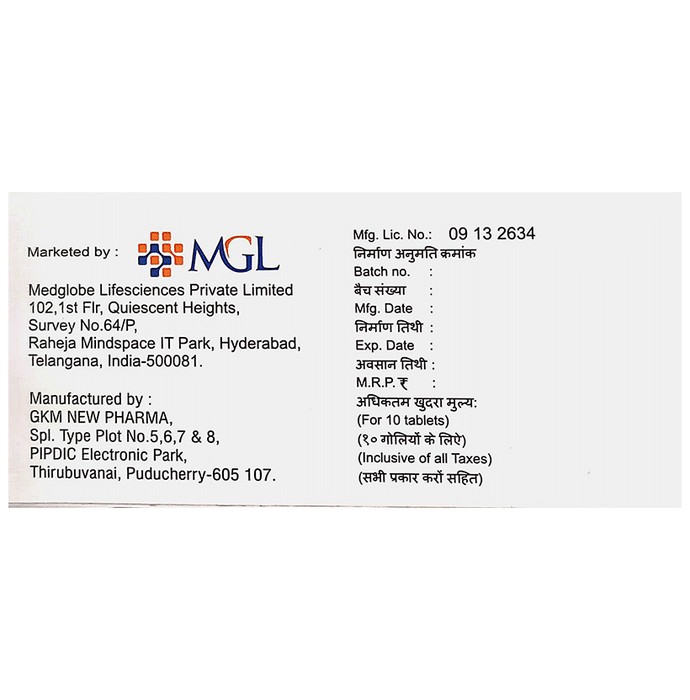Mgrab Tablet
Marketer
Medglobe Lifesciences Private Limited
Salt Composition
Rabeprazole (20mg)
Overview Mgrab Tablet
Gastracid tablets diminish gastric acid production. They treat acid-related disorders affecting the stomach and intestines, including acid reflux, peptic ulcers, and Zollinger-Ellison syndrome, alleviating symptoms and facilitating healing. Gastracid should be taken once daily, one hour before a meal, ideally in the morning. Dosage is determined by your condition and response, requiring consistent daily intake as prescribed, even if symptoms subside. Dietary modifications, such as smaller, more frequent meals and avoiding caffeine, spicy foods, and fatty foods, can complement treatment. Common, generally mild, side effects include nausea, vomiting, headache, dizziness, gas, diarrhea, and stomach ache. Persistent or bothersome side effects warrant medical attention. Prolonged use (over a year), particularly at higher doses, may raise bone fracture risk; discuss bone health strategies, including calcium and vitamin D supplementation, with your doctor. Hypomagnesemia (low magnesium) may occur after three months or more of use, potentially causing fatigue, confusion, dizziness, muscle spasms, and irregular heartbeat. Your doctor may monitor your magnesium levels. Gastracid is unsuitable for individuals with severe liver disease, those on HIV medication, those with a history of similar medication allergies, or pre-existing osteoporosis. Pregnant or breastfeeding women should seek medical advice before use. Alcohol consumption should be avoided due to its acid-inducing effects. Refrain from operating machinery if dizziness or drowsiness occurs.
Uses of Mgrab Tablet
Managing gastroesophageal reflux, peptic ulcers, and Zollinger-Ellison syndrome.
Major Benefits of Mgrab Tablet:
Follow your doctor's instructions precisely regarding dosage and treatment length for this medication. Ingest the Mgrab Tablet whole; avoid chewing, crushing, or breaking it. Administer on an empty stomach.
Common Side effects of Mgrab Tablet:
- Diarrhea
- Dizziness
- Flatulence
- Headache
- Nausea
- Sore throat
- Stomach pain
- Vomiting
How to use Mgrab Tablet:
Follow your doctor's instructions precisely regarding dosage and treatment length for this medication. Ingest the Mgrab Tablet whole; do not chew, crush, or fracture it. Administer this medication on an empty stomach.
How Mgrab Tablet works:
Acid reflux and indigestion find relief with Mgrab Tablet, a proton pump inhibitor that lessens stomach acid production.
SAFETY ADVICE
 AlcoholCAUTION
AlcoholCAUTION
Use of Mgrab Tablet with alcohol requires careful consideration. Seek medical advice before combining them.
 PregnancyCONSULT YOUR DOCTOR
PregnancyCONSULT YOUR DOCTOR
The use of Mgrab Tablet during pregnancy may pose risks. While human research is scant, animal studies indicate potential harm to a developing fetus. A physician will assess the potential benefits against any risks prior to prescribing. Seek medical advice.
 Breast feedingCONSULT YOUR DOCTOR
Breast feedingCONSULT YOUR DOCTOR
Use of Mgrab Tablet while breastfeeding is likely inadvisable. Available human data indicates potential drug transfer to breast milk, posing a possible risk to the infant.
 DrivingUNSAFE
DrivingUNSAFE
Taking Mgrab Tablet might reduce attentiveness, impair vision, and cause drowsiness or dizziness. Driving should be avoided if these effects are experienced.
 KidneySAFE IF PRESCRIBED
KidneySAFE IF PRESCRIBED
Mgrab tablets pose no safety concerns for patients with kidney disease; no dosage modification is necessary.
 LiverSAFE IF PRESCRIBED
LiverSAFE IF PRESCRIBED
Mgrab Tablet poses no safety concerns for patients with hepatic impairment; dose modification is unnecessary.
What if you forget to take Mgrab Tablet :
Should you forget to take a Mgrab Tablet, administer it at your earliest convenience. Nevertheless, if your next scheduled dose is imminent, omit the missed dose and resume your usual dosage regimen. Avoid taking a double dose.
Facts to Know About Mgrab Tablet
| Label | Value |
|---|---|
| Chemical Type | Benzimidazole Sulfoxide |
| Developing Habits | No. |
| Treatment Category | Gastrointestinal system |
| Actions | Gastric acid suppressants |






